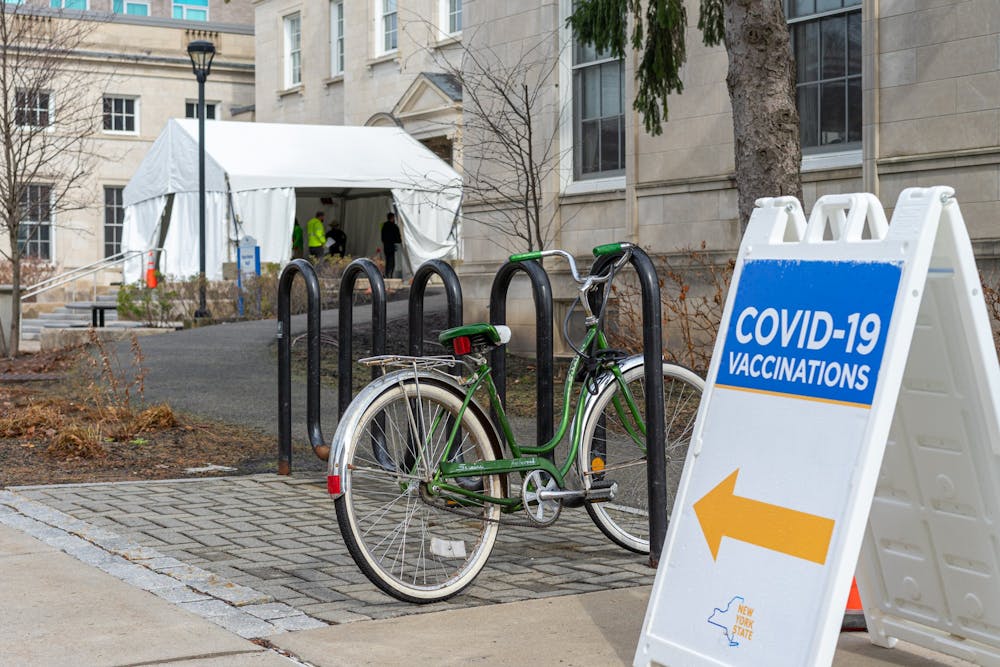Students who live on campus, have an underlying health condition, work in a high-risk setting or meet any other of the CDC’s expanded eligibility requirements can get a COVID-19 booster shot, the university announced Oct. 25.
Students must wait two months after having received a Johnson & Johnson vaccine or six months after having received their second dose of a Pfizer-BioNTech or Moderna vaccine.
New York State classifies dorms and university apartments as high-risk settings, but that definition excludes UB students living off campus. Students living in off-campus housing may still be eligible for a booster based on other criteria.
UB is recommending — but not requiring — that all eligible students, faculty and staff who qualify receive a booster.
“We are pleased the CDC has expanded the eligibility for COVID-19 booster shots, and we strongly encourage all members of the UB community to get this additional dose as soon as they are eligible,” Michael Cain, the former vice president for health sciences and former dean of the Jacobs School of Medicine, said.
Booster shots are available at South Campus’ Harriman Hall, a state-operated vaccination site. While this location currently only offers the Pfizer booster, the CDC supports mixing and matching initial dosages with COVID-19 booster shots.
UB also offers flu shots at clinics located on the university’s North, South and Downtown campuses. Students can get their flu shot and COVID-19 booster shot on North Campus on Tuesdays from 11 a.m. to 2 p.m. in Talbert Hall.
COVID-19 booster shots are also available in most pharmacies, according to Nancy Nielsen, senior associate dean for health policy at the Jacobs School of Medicine.
Students do not need to make an appointment to receive their shot. A government-issued ID and COVID-19 vaccination card must be presented to receive a booster shot.
University officials and health experts urge campus community members to follow the latest preventative measures and receive the booster shot.
“We’re getting into that stretch, where exams are coming up: midterms and then finals over the next sort of six and seven weeks or so,” Thomas Russo, chief of the Division of Infectious Diseases in the UB Department of Medicine, said. “If you get COVID-19, you’re fatigued, you’ve lost a sense of taste and smell, you’ve got a variety of other symptoms — it’s just better to feel great.”
UB has a 14-day rolling percent positive average of 0.65% for COVID-19 as of Nov. 1 and a 99% student vaccination rate on campus, but health experts reiterate that complete protection against COVID-19 is not guaranteed, with research showing signs of waning efficacy of COVID-19 vaccinations over the course of several months.
Russo says that fully vaccinated individuals who received the Johnson & Johnson vaccine are more vulnerable than other vaccine recipients.
“Not all of our vaccines were equally efficacious,” he said. “There’s a bigger gap in terms of the efficacy of J&J.”
In December 2020, both Moderna and Pfizer recorded about 95% efficacy in initial Phase 3 clinical data. The Johnson & Johnson vaccine was measured at 72% overall efficacy, according to FDA data from February.
Students who originally received the Johnson & Johnson vaccine would stand to gain the most from getting a booster jab of either of the two mRNA vaccines, Russo says. Antibody counts would increase 35- to 70-fold with Pfizer or Moderna booster shots, while the Johnson & Johnson booster would afford a four-fold increase in antibodies.
“If you got the J&J vaccine, your level of protection for asymptomatic mild disease and even landing in hospital is significantly less than the Pfizer and Moderna vaccines,” Russo said. “And so though we’re not mandating them, I would strongly suggest that anyone that got the J&J vaccine should go ahead and consider getting a booster shot.”
The university says it will continue to work with SUNY, the CDC, local and state health departments and in-house health experts to determine if — or when — a mandate might become necessary.
But Russo says that fully vaccinated individuals would need to be just as vulnerable as the unvaccinated before a booster mandate would be considered.
Though he is a self-described “optimist” when it comes to the prospect of returning to normal, Russo says it remains as important as ever to adhere to university guidelines, such as proper mask use indoors and at outdoor gatherings, to keep COVID-19 cases low.
“I’m hoping that next semester is going to look a lot better,” Russo said. “But we’re just not quite through this and this is not the time to let your guard down. This is the time to persevere over the next few weeks.”
The news desk can be reached at news@ubspectrum.com

Kyle Nguyen is a senior news/features editor at The Spectrum.





